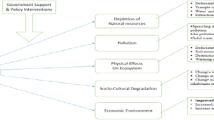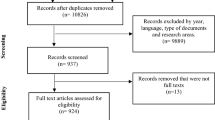Abstract
Research has identified many criteria that contribute to selecting a sea port, yet not much is known about how port users look at these criteria and how they argue on the factors that contribute to their port choice behavior. This study uses the Q methodology to explore the typology of port choice in conjunction with the port users’ own representations of their choice behavior. We employ an in-depth methodology that incorporates both quantitative and qualitative methods for an investigation of port choice behavior among port users particularly in South Korea. The analysis revealed four main types: Service- and corporation-oriented; Location and cost saver; On-time and task achiever; and Capacity and infrastructure friendly type. The results provide some implications and guidance for formulating policies and effective strategies for improving the competitiveness of port authorities and port operators.


Similar content being viewed by others
References
Acosta, M., Coronado, D. and Cerban, M.M. (2007) Port competitiveness in container traffic from an internal point of view: The experience of the port of Algeciras bay. Maritime Policy & Management 34 (5): 501–520.
Ahn, W., Lim, S. and Ahn, S. (2006) A study on analyzing bottlenecks of logistics in Incheon Port: Focused on container freight. Korean Research of Logistics 14 (2): 65–90.
Baek, I. and Ha, C. (2006) A study on deciding a container feeder port development priority. Journal of Fisheries and Marine Sciences Education 18 (2): 172–182.
Brown, S.R. (1980) Political Subjectivity: Applications of Q Methodology in Political Science. New Haven, CT: Yale University Press.
Cross, R.M. (2005) Exploring attitudes: The case for Q methodology. Health Education Research 20 (2): 206–213.
Cullinane, K., Song, D. and Gray, R. (2002) A stochastic frontier model of the efficiency of major container terminals in Asia: Assessing the influence of administrative and ownership structures. Transportation Research Part A: Policy and Practice 36 (8): 743–762.
Davis, H.C. (1983) Regional port impact studies: A critique and suggested methodology. Transportation Journal 23 (2): 61–71.
Ducruet, C., Lee, S. and Roussin, S. (2009) Local strength, global weakness: A maritime network perspective on South Korea as Northeast Asia’s logistics hub. International Journal of Maritime Affairs and Fisheries 1 (1): 32–50.
Frantzi, S., Carter, N.T. and Lovett, J.C. (2009) Exploring discourses on international environmental regime effectiveness with Q methodology: A case study of the Mediterranean action plan. Journal of Environmental Management 90 (1): 177–186.
French, R.A. (1979) Competition among selected Eastern Canadian ports for foreign cargoes. Maritime Policy & Management 6 (1): 5–13.
Ha, M. (2003) A comparison of service quality at major container ports: Implications for Korean ports. Journal of Transport Geography 11 (2): 131–137.
Heaver, T.D. (1995) The implications of increased competition among ports for port policy and management. Maritime Policy and Management 22 (2): 125–133.
Hung, S., Lu, W. and Wang, T. (2010) Benchmarking the operating efficiency of Asia container ports. European Journal of Operational Research 203 (3): 706–713.
Kim, H. (2008) Q Methodology: Scientific Philosophy, Theory, Analysis and Application. Seoul: Communication Books.
Kim, J. (2012) A study on learners’ perceptional typology and relationships among the learners’ type, characteristics, and academic achievement in a blended environment. Computer & Education 59 (2): 304–315.
Levy, M.R. and Windahl, S. (1984) Audience activity and gratification: A conceptual clarification and exploration. Communication Research 11 (1): 51–78.
Lirn, T., Thnopoulou, H.A. and Beresford, A.K. (2003) Transhipment port selection and decision-making behaviour: Analysing the Taiwanese case. International Journal of Logistics: Research and Applications 6 (4): 229–244.
Mangan, J., Lalwani, C. and Gardner, B. (2002) Modeling port/ferry choice in RORO freight transportation. International Journal of Transport Management 1 (1): 15–28.
McKeown, B. and Thomas, D. (1988) Q Methodology. Newbury Park, CA: Sage.
Nir, A., Lin, K. and Liang, G. (2003) Port choice behaviour – From the perspective of the shipper. Maritime Policy & Management 30 (2): 165–173.
Roh, Y. and Kim, S. (2007) A study on the activation strategies by competitiveness analysis of Pyeontack port. Korean Journal of Distribution and Management 10 (4): 5–26.
Saaty, T.L. (1994) How to make a decision: The analytic hierarchy process. Interfaces 24 (6): 19–43.
Slack, B. (1985) Containerization, inter-port competition, and port selection. Maritime Policy & Management 12 (4): 293–300.
Sletmo, G.K. and Holste, S. (1993) Shipping and the competitive advantage of nations: The role of international ship registers. Maritime Policy & Management 20 (3): 243–255.
Song, D. (2009) Global maritime transport and logistics: Recent developments and implications for Asian container ports. International Journal of Maritime Affairs and Fisheries 1 (2): 27–37.
Tongzon, J. (2009) Port choice and freight forwarders. Transportation Research Part E 45 (1): 186–195.
Tongzon, J. and Heng, W. (2005) Port privatization, efficiency and competitiveness: Some empirical evidence from container ports. Transportation Research Part A 39 (5): 405–424.
Tongzon, J. and Sawant, L. (2007) Port choice in a competitive environment: From the shipping line’s perspective. Applied Economics 39 (4): 477–492.
Walter, A. (1975) Marginal cost pricing in ports. The Logistics and Transportation Review 11 (4): 297–308.
Acknowledgements
The author is grateful to the anonymous reviewers and the editor-in-chief of this journal for their useful and constructive comments.
Author information
Authors and Affiliations
Rights and permissions
About this article
Cite this article
Kim, JY. Port user typology and representations of port choice behavior: A Q-methodological study. Marit Econ Logist 16, 165–187 (2014). https://doi.org/10.1057/mel.2013.26
Published:
Issue Date:
DOI: https://doi.org/10.1057/mel.2013.26




